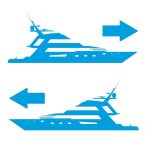
Please find below some important info to know about chartering in Spain:
As is well known, chartering in countries like France, Italy or Malta can benefit from really reduced VAT rates on charter fees. This is not the case in Spain. What is the reason why? Let’s find out what are the legal grounds on which this VAT reduction is based and what other implications this legal provision has.
Article 58 of EU Council Directive 2006/112/EC, VAT Directive, entitled “criterion of effective use and enjoyment”, provides that:
In order to avoid double taxation, non-taxation or distortion of competition, Member States may, with regard to the supply of the services referred to in Article 56(1) and with regard to the hiring out of means of transport:
(a) consider the place of supply of any or all of those services, if situated within their territory, as being situated outside the Community, if the effective use and enjoyment of the services takes place outside the Community;
(b) consider the place of supply of any or all of those services, if situated outside the Community, as being situated within their territory, if the effective use and enjoyment of the services takes place within their territory.
How does this affect chartering in the EU and more specifically chartering in Spain?
As the article lays down in its first paragraph, Member States may, which means this is an optional criterion which might be applied by each Member State or not. Having said this, we must distinguish what is stipulated in paragraphs (a) and (b).
Paragraph (a) – as it is clearly defined, the provision seeks to minimize VAT taxation applicable to certain services, among them the hiring out of means of transport (for instance charter), when part of the enjoyment takes place outside the Community. This provision or approach is in place in France or Italy which allows chartering in these countries to benefit from reduced VAT rates. However, this is not the case of Spain, which making use of its optional right, did not implement this provision in the internal Spanish VAT law. Therefore, chartering in Spain is subject to a flat VAT rate which does not benefit from any reduction even sailing beyond 12 nautical miles.
Paragraph (b) – the second part of the article seeks to subject to VAT certain services, which, although according to the rules on the place of supply can be understood to be provided outside the Community, their effective enjoyment takes place in the Community. This might be the case of a charter starting in Montenegro or Gibraltar, territories outside the Community, and visiting a Member State. There are certain countries which apply this approach, such as Italy. This is the case of Spain too. Spain implemented this provision in article 70.Two of the Spanish VAT law. Therefore, although not very well known, this rule is in force in Spain.
In practical terms, this would involve for instance that a charter starting in Gibraltar and visiting Spanish territory would oblige the yacht owning company to register for VAT in Spain and to pay to the Spanish tax authorities VAT on the length of the charter taking place in Spain.
Therefore, it cannot be said that the use and enjoyment provision is not in practice in Spain. It is, but unfortunately only the more burdensome part of the EU provision is applicable.
For further information, please email our Spanish referent Mr. Alex Chumillas to alex@taxmarine.com or send your inquiry to info@yachtwelfare.it. We are always pleased to assist you and remain at your disposal.
Thank you to our Spanish partner Mr. Alex Chumillas:









